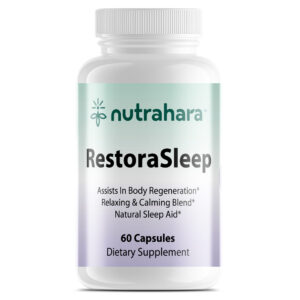
Nutrahara Blog
Nutrahara Blog
7 Natural Ways to Build a Strong Immune System for Women
1. Introduction
A strong immune system is more than just a defense against illness; it’s the cornerstone of vitality, longevity, and overall well-being. For women navigating the complexities of hormonal shifts, stress, and unique health challenges, maintaining robust immunity is essential at every stage of life. From menstruation and pregnancy to menopause, a woman’s immune system is intricately tied to her physical and emotional state, making it vital to address its care holistically.
While many focus on generic advice like “eat fruits and vegetables” or “exercise more,” the key to a resilient immune system lies in understanding the unique ways women’s bodies interact with natural remedies, lifestyle changes, and nutrition. For example, the connection between stress hormones like cortisol and immune suppression is particularly significant for women juggling careers, family, and self-care. Practices like mindfulness and yoga do more than calm the mind—they regulate immune responses, a fact often overlooked.
Additionally, women-specific factors such as the impact of estrogen on immunity, the role of gut health during pregnancy, and how sleep quality affects post-menopausal health demand deeper exploration. This guide offers unique insights and actionable strategies tailored for women to build lasting immune strength through natural, evidence-based approaches.
2. Understanding the Immune System
A woman’s immune system is a complex network of cells, tissues, and organs designed to protect the body from harmful invaders such as bacteria, viruses, and toxins. However, its efficiency isn’t static—it fluctuates based on factors such as age, hormonal changes, stress, and lifestyle. Understanding these dynamics is the first step toward creating a tailored approach to immune health.
What is the Immune System?
The immune system operates through two primary mechanisms:
- Innate Immunity: The body’s first line of defense, which includes barriers like skin, mucous membranes, and immune cells that attack invaders.
- Adaptive Immunity: A learned response that develops over time, providing long-term protection through antibodies and memory cells.
Both components need to function in harmony for optimal protection, especially during periods of hormonal fluctuations, such as pregnancy or menopause, when immunity can naturally dip.
Why Women Need a Tailored Approach
Hormonal changes throughout a woman’s life directly influence immune function:
- Estrogen’s Role: Estrogen enhances immune responses, which is why women are generally less susceptible to certain infections before menopause. However, this heightened activity can sometimes contribute to autoimmune conditions.
- Stress and Immunity: Women often experience chronic stress from balancing responsibilities, which can suppress immune activity over time by elevating cortisol levels.
- Age-Related Changes: As women age, the immune system naturally weakens, a process known as immunosenescence, making healthy lifestyle choices increasingly important.
Insights from Research
Research into the relationship between lifestyle and immunity highlights the importance of factors like diet, exercise, and stress management. According to Harvard Health, while scientists are still exploring how these factors directly affect immune response, adopting healthy habits improves overall well-being and likely benefits immunity too.
Key Takeaways for Women
- Prioritize stress management techniques such as meditation and deep breathing.
- Focus on nutrient-dense foods that support immunity, like leafy greens and citrus fruits.
- Incorporate moderate exercise to strengthen the immune system without overtaxing it.
By understanding how the immune system works and how life stages influence it, women can adopt targeted strategies to stay resilient and healthy at any age.
3. Top Natural Treatments for a Resilient Immune System
Women’s immune health can benefit greatly from nature’s powerful arsenal of herbs, superfoods, and holistic remedies. These treatments not only support the body’s natural defenses but also enhance overall well-being by addressing specific immune challenges women face throughout their lives.
Herbal Remedies for Immunity
Nature offers an abundance of herbs that can strengthen the immune system. These time-tested remedies are packed with bioactive compounds that work in synergy with the body:
- Echinacea: Known for its ability to reduce the duration and severity of colds, echinacea boosts the production of white blood cells.
- Elderberry: Rich in antioxidants and vitamins, elderberry helps combat inflammation and supports immune responses during seasonal illnesses.
- Turmeric: A potent anti-inflammatory, turmeric’s active ingredient, curcumin, enhances immune cell activity and helps fight off infections.
- Astragalus Root: Traditionally used in Chinese medicine, astragalus strengthens immunity by increasing white blood cell count and reducing oxidative stress.
Superfoods for Daily Immune Support
Incorporating nutrient-dense foods into your diet is a simple yet effective way to build a resilient immune system:
- Garlic: Contains allicin, a compound known for its antimicrobial properties that help fend off viruses and bacteria.
- Spinach: Packed with vitamins A, C, and E, as well as antioxidants, spinach supports immune cell function.
- Citrus Fruits: Oranges, lemons, and grapefruits are high in Vitamin C, which boosts the production of white blood cells.
- Yogurt: Rich in probiotics, yogurt supports gut health, which is directly linked to stronger immunity.
- Green Tea: Loaded with antioxidants such as EGCG, green tea strengthens immune defenses and reduces inflammation.
Combining Natural Remedies with Lifestyle Changes
For maximum benefit, combine these natural treatments with a healthy lifestyle:
- Drink herbal teas made with immune-boosting ingredients like ginger and lemon.
- Add spices like turmeric and garlic to meals for an extra dose of immunity.
- Use elderberry syrup or capsules during cold and flu season as a preventive measure.
Natural treatments, when integrated into daily life, offer a powerful and holistic approach to strengthening immunity, keeping women healthier and more vibrant through every stage of life.
4. Vitamins and Supplements for Immune Health
While natural remedies like herbs and superfoods play a crucial role in supporting the immune system, vitamins and supplements are essential for filling nutritional gaps and optimizing immune function. A targeted approach to supplementation can help women build a strong, resilient immune system that can withstand the stressors of daily life and the changes that come with different life stages.
Good Immune System Vitamins
Certain vitamins are particularly important for maintaining and boosting immune function. These vitamins support various immune pathways, enhance white blood cell activity, and help the body fight off infections.
- Vitamin C: Known for its powerful antioxidant properties, Vitamin C plays a crucial role in the immune system by stimulating the production and function of white blood cells. It also helps protect the body against oxidative stress caused by free radicals.
- Sources: Citrus fruits, strawberries, bell peppers, broccoli.
- Supplementation: Ideal during cold and flu season or in times of high stress.
- Vitamin D: Often referred to as the “sunshine vitamin,” Vitamin D is vital for immune regulation. It helps activate T-cells, which are essential for fighting infections. Low levels of Vitamin D are linked to an increased risk of respiratory infections.
- Sources: Sunlight, fatty fish, fortified foods.
- Supplementation: Especially important for those who live in areas with limited sunlight or during the winter months.
- Vitamin E: This powerful antioxidant supports immune function by protecting cells from oxidative damage. Vitamin E also enhances the body’s ability to produce immune cells and fight off infections.
- Sources: Nuts, seeds, spinach, and avocados.
- Supplementation: Helpful during periods of stress or when dealing with chronic health conditions.
Essential Supplements for Women
In addition to vitamins, certain supplements are particularly beneficial for women seeking to enhance their immune health. These supplements can support hormonal balance, gut health, and overall immune function.
- Probiotics: Since a large portion of the immune system resides in the gut, maintaining a healthy microbiome is crucial. Probiotics help replenish beneficial bacteria and support gut health, leading to a stronger immune response.
- Sources: Fermented foods (kimchi, kefir, sauerkraut), probiotic supplements.
- Supplementation: Ideal for maintaining gut health and strengthening immunity, especially during or after antibiotic use.
- Zinc: This mineral is involved in nearly every aspect of immune function, from the development of immune cells to wound healing. Zinc also helps prevent viral replication and reduces the duration of colds.
- Sources: Shellfish, legumes, seeds, nuts.
- Supplementation: Recommended during cold season or for those with a zinc deficiency.
- Ashwagandha: An adaptogenic herb that reduces stress and helps modulate immune function. Chronic stress can suppress immune responses, and ashwagandha is known for its ability to regulate cortisol levels and boost immunity.
- Sources: Ashwagandha root (often found in supplements).
- Supplementation: Helpful during times of high stress or when seeking to balance adrenal function.
Incorporating the right combination of vitamins and supplements into a daily routine is an effective strategy for supporting a strong immune system. These nutrients, when paired with a healthy diet and lifestyle, ensure that the immune system is working at its best, helping women maintain health and vitality throughout their lives.
5. Exercise and Yoga for Immune Support
Physical activity plays a crucial role in maintaining a strong immune system, and it’s well established that regular exercise enhances immune function. For women, exercise not only supports immune health but also helps manage stress, balance hormones, and improve overall well-being. Yoga, in particular, offers a dual benefit by combining gentle movement, deep breathing, and relaxation to support both the body and mind.
Physical Activity to Strengthen Immunity
Moderate exercise has a direct and positive impact on immune health. It encourages better circulation, allowing immune cells to travel through the body more efficiently. Regular movement also reduces inflammation and lowers the risk of chronic diseases that can weaken the immune system.
- Boosts White Blood Cell Production: Regular physical activity helps increase the number of white blood cells, which are the body’s first line of defense against infection.
- Reduces Inflammation: Exercise helps to lower inflammation in the body, a key factor in immune system dysfunction. Chronic inflammation is linked to a variety of immune-related issues, including autoimmune conditions.
- Improves Sleep: Exercise also improves the quality of sleep, which is essential for optimal immune function. Sleep is a time when the body’s immune system is actively working to regenerate and repair.
- Stress Reduction: Engaging in exercise helps reduce stress hormones like cortisol, which can suppress immune function when levels are too high.
- Recommended Activities:
- Walking, jogging, cycling, or swimming for cardiovascular health.
- Strength training to maintain muscle mass and enhance metabolic health.
- Low-impact exercises like Pilates for overall flexibility and balance.
- Recommended Activities:
Yoga for Immunity and Relaxation
Yoga combines breathwork, physical postures, and mindfulness to enhance immunity by reducing stress and promoting relaxation. The practice has been shown to balance hormone levels, improve gut health, and support overall immune function.
- Breathwork (Pranayama): Deep breathing exercises stimulate the parasympathetic nervous system, which calms the body and helps reduce stress. This is vital for immune health, as chronic stress can weaken the immune system.
- Reduces Stress Hormones: Certain yoga poses help to lower cortisol levels, balancing the body’s stress response and protecting immune health.
- Increases Circulation: Many yoga poses promote blood flow, ensuring that immune cells can circulate effectively and reach areas that need defense.
- Promotes Mind-Body Connection: The mindfulness aspect of yoga helps women manage emotions and maintain mental clarity, which indirectly benefits the immune system by mitigating the effects of psychological stress.
- Recommended Poses for Immune Support:
- Downward Dog: A full-body stretch that stimulates circulation and boosts overall energy.
- Child’s Pose: A restorative posture that calms the nervous system and reduces tension.
- Warrior II: Opens the chest and lungs, helping to improve respiration and reduce stress.
- Legs Up the Wall: A restorative pose that helps the body relax and supports lymphatic drainage.
- Recommended Poses for Immune Support:
By incorporating both exercise and yoga into daily routines, women can strengthen their immune systems while simultaneously nurturing their mental and emotional health. This holistic approach not only boosts immune defenses but also enhances overall quality of life.
6. Lifestyle Changes to Boost Immunity
Incorporating key lifestyle changes can significantly enhance immune function and overall well-being. By adopting a holistic approach that includes managing stress, optimizing sleep, and making conscious decisions about diet and habits, women can strengthen their immune system and support their body’s natural defenses.
1. Stress Management
Chronic stress is one of the most significant factors that weaken the immune system. Prolonged stress increases the production of cortisol, a hormone that, in excess, suppresses immune function.
- Mindfulness Meditation: Practicing mindfulness or guided meditation can help calm the mind and reduce the body’s stress response.
- Breathing Exercises: Techniques like deep breathing or the 4-7-8 method can activate the parasympathetic nervous system, reducing stress levels and enhancing immune function.
- Time for Hobbies: Engaging in activities that bring joy and relaxation—such as reading, crafting, or spending time in nature—can reduce stress and promote emotional well-being.
2. Quality Sleep
Sleep is essential for immune health as it is during sleep that the body repairs and regenerates itself. Poor or insufficient sleep weakens immune responses and makes the body more susceptible to illness.
- Create a Consistent Sleep Schedule: Going to bed and waking up at the same time each day helps regulate the circadian rhythm.
- Optimize Sleep Environment: A dark, cool, and quiet room promotes better sleep quality.
- Limit Screen Time: Reducing exposure to screens before bedtime can help improve sleep quality by minimizing blue light exposure, which interferes with melatonin production.
3. Healthy Nutrition
A nutrient-rich diet supports the immune system by providing the vitamins, minerals, and antioxidants the body needs to function optimally.
- Stay Hydrated: Drink plenty of water to support circulation, detoxification, and overall immune function.
- Eat a Rainbow of Foods: Include a variety of colorful fruits and vegetables in your diet to ensure you’re getting a wide range of vitamins and antioxidants that support immune health.
- Limit Processed Foods: Minimize the intake of refined sugars, trans fats, and highly processed foods that can increase inflammation and compromise immune function.
4. Healthy Social Connections
Strong relationships and social connections play a crucial role in mental and emotional health, which in turn supports the immune system.
- Foster Meaningful Relationships: Engaging in positive interactions with family, friends, and community can help reduce feelings of loneliness and stress.
- Participate in Group Activities: Social activities like volunteering, group fitness classes, or community events can promote both mental health and social bonding.
By focusing on stress management, sleep, nutrition, and social well-being, women can create a lifestyle that not only boosts their immune health but also fosters long-term vitality and resilience.
7. Real-Life Testimonials: Women Who Strengthened Their Immune Systems
Hearing firsthand experiences from women who have successfully improved their immune health can be both inspiring and encouraging. These stories highlight the powerful effects of natural treatments, lifestyle changes, and consistent self-care practices in building a resilient immune system.
Testimonial 1: Sarah, 42 – Embracing Yoga and Supplements
Sarah, a busy mother of two, found herself constantly battling colds and fatigue. After learning about the importance of immunity and the role of yoga and supplements, she decided to make changes to her routine.
- What She Did:
- Started practicing yoga three times a week, focusing on stress-reducing poses like Child’s Pose and Warrior II.
- Incorporated Vitamin C and Vitamin D supplements into her daily routine.
- Results:
- Sarah noticed a significant reduction in the frequency of colds and a general boost in her energy levels.
- She also felt less stressed, which allowed her to manage her responsibilities more effectively without feeling overwhelmed.
Testimonial 2: Maria, 55 – Focus on Nutrition and Sleep
Maria, navigating the post-menopausal stage, found that her immune system was no longer as resilient as it once had been. She realized that improving her diet and sleep could help her regain vitality.
- What She Did:
- Focused on eating a balanced diet rich in fruits, vegetables, and anti-inflammatory foods like turmeric.
- Prioritized getting 7-8 hours of sleep each night to support her body’s repair process.
- Results:
- Maria experienced fewer seasonal illnesses and felt more balanced in her overall health.
- Her energy and mood improved, and she felt empowered by the changes she had made to her lifestyle.
Testimonial 3: Jenna, 38 – Stress Management and Exercise
Jenna had struggled with managing her stress levels due to work pressure, which started affecting her immune system. She sought ways to reduce stress naturally while maintaining a regular exercise routine.
- What She Did:
- Incorporated daily breathing exercises and mindfulness meditation into her routine to manage stress.
- Committed to 30-minute workouts five days a week, including a mix of cardio and strength training.
- Results:
- Jenna found that stress-related illnesses were far less frequent.
- She felt more energized and empowered, able to handle life’s challenges with more resilience and strength.
These real-life testimonials show that with small, consistent changes in diet, exercise, and mental health practices, women can strengthen their immune systems and feel more empowered in their daily lives.
8. Quick Tips and Tricks for Women’s Immune Health
Incorporating small yet effective habits into your daily routine can make a big difference in boosting your immune health. Here are some quick and actionable tips that women can easily implement:
- Stay Hydrated: Drink at least 8 cups of water daily to support healthy immune function.
- Get Moving: Aim for 30 minutes of moderate exercise at least 5 times a week to strengthen your immune system.
- Prioritize Sleep: Ensure 7-8 hours of quality sleep each night to allow your body’s immune cells to regenerate.
- Manage Stress: Practice deep breathing exercises or mindfulness meditation for 10 minutes a day to lower cortisol levels.
- Eat Immune-Boosting Foods: Include foods rich in Vitamin C (like citrus), Vitamin D (like fatty fish), and Zinc (like seeds and nuts) in your diet.
- Take Probiotics: Incorporate probiotic-rich foods or supplements to maintain gut health, which is crucial for immune function.
These simple changes can have a profound impact on your immune system and overall health, helping you stay strong and resilient.
9. Conclusion
Building and maintaining a strong immune system is an ongoing process that involves making conscious decisions about diet, exercise, stress management, and self-care. By adopting natural treatments, including vitamins and supplements, practicing regular exercise and yoga, and making healthy lifestyle changes, women can significantly enhance their immune resilience. Small daily habits, such as prioritizing sleep, staying hydrated, and managing stress, also play a key role in supporting immune health.
With consistent effort and mindfulness, women can feel empowered to take control of their health, strengthen their defenses, and enjoy a more vibrant, energetic life.
Written by the Nutrahara Team
This article was developed by the Nutrahara team of nutrition scientists and naturopaths, who specialize in formulating safe, effective, and science-backed supplements for women’s health. Every ingredient we use is carefully selected to support your body’s unique needs—naturally. Follow us on LinkedIn for expert insights and updates on our latest wellness solutions.











